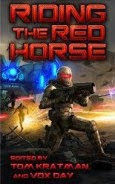http://elitistbookreviews.blogspot.com/
Another 2015 Best Fanzine Hugo nominee. Also, another review zine.
Unfortunately, during as much of the nominated year as I could push through, it's visually hard to read--light text on dark grey background. I also didn't find the tone and style of the reviews engaging, but I was probably less receptive because of the dark background and very light, thin text. For me, that's a dealbreaker. If I'm going to read it, it has to be readable.
Not recommended.
Another 2015 Best Fanzine Hugo nominee. Also, another review zine.
Unfortunately, during as much of the nominated year as I could push through, it's visually hard to read--light text on dark grey background. I also didn't find the tone and style of the reviews engaging, but I was probably less receptive because of the dark background and very light, thin text. For me, that's a dealbreaker. If I'm going to read it, it has to be readable.
Not recommended.
























